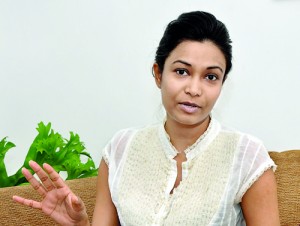‘Making History’ through content and venues
Radhika Hettiarachchi’s usually quiet apartment on Castle Street has been attracting more than its fair share of guests. The new curator of Colomboscope, Radhika has inherited the post (and the new acquaintances that go with it) from author Ashok Ferrey, who helmed it in 2013. An interesting programme shows promise, building on a first year that incorporated art in multiple mediums; theatre, dance, film, music and literature events will punctuate the course of the three-day event. Simultaneously, in a round of conversations, the idea of ‘Making History’ will be approached from different perspectives. We do an early run-through in our interview, when Radhika begins by describing her own, very personal investment in the festival theme.

Radhika: Interested in archiving and the nature of historical records. Pic by Indika Handuwala
It’s been a few months since the last outing of Her stories, the exhibition that Radhika conceived of and curated. Her stories were built around interviews with Sri Lankan mothers from the South and the North. That project, which has since found a home in the National Archives, spoke to Radhika’s interest in archiving and the nature of historical records. “We are who we are because of our part and because of our collective past,” she says. Having constructed her sessions with care, Radhika says she’s interested in how art articulates and archives memory and in the notion of individual memory vs. public remembrance. The diverse programme looks at these issues through the lens of social historians and feminists, performers, writers, journalists and musicians.
Populating these panels are individuals sponsored by the Goethe Institut, the British Council and the Alliance Francaise de Kotte. Explaining the selection process, Radhika says she worked closely with representatives to invite people currently on the festival circuit – the British Council for instance typically sponsors new writers on the Granta list – and then paired them with their local counterparts. With a few exceptions, all the moderators for the sessions are Sri Lankans. The last is a deliberate choice, says Radhika who hopes local moderators will anchor the sessions in the Sri Lankan context.
When it came to planning her programme, Radhika chose to think not only in terms of how this applied to people but also how it applied to places. Colomboscope is generating interest in part because of its choice of venues. The Grand Oriental Hotel, the New Town Hall and the Whist Bungalow feature prominently in a programme that will have audiences leaving behind their usual stomping grounds in favour of more eclectic locations. Radhika credits one of Colomboscope’s partners, the Goethe Institut, with importing the German trend of bringing mainstream events to alternate venues. As a curator, it’s inspired her as well: each of these locations are puzzle pieces in the history of Colombo and they are venerable and interesting enough to be players in their own right. (She likes to think of the Whist Bungalow as an “old soldier and a gentleman.”)
Explaining that each day’s events are essentially confined to a certain area, Radhika adds that the audiences will be ferried to the Whist Bungalow and the Grand Oriental Hotel by a free bus service operating on the relevant days. “I think people are going to enjoy that aspect of it, because we will be transporting them in terms of both time and space,” she says, explaining that venues will be decked out to suit the theme. Anyone with a weakness for cards will find the Whist Bungalow most attractive – an ongoing game of whist will be set up for whoever would like to sit down and play.
As a part of their determination to throw the festival open to a wider audience, session tickets are priced at an affordable Rs.500/- each. (Larger events like Paraya and Gob Squads performance will cost Rs.1000/-) However, 50 free tickets per session are being held for local students on a first come, first serve basis. Students must register in advance. There are also a significant number of free events.
Colomboscope is sponsored by Standard Chartered in partnership with the Goethe Institute, the British Council Festival with support from Alliance Francaise de Kotte. Tickets are available from Goethe institute and the British Council during open hours and at the events venues. Further details on the festival are available at www.colomboscope.org.


